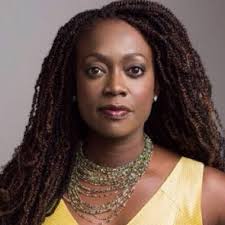An Interview with Ashley Allison, EVP, The Leadership Conference
Ashley Allison, Executive Vice President, Campaigns & Programs, The Leadership Conference
Community-centered. Meditative. Real.
Ashley Allison reflects on how she’s following her heart, finding her voice, and taking center stage as she works toward the goal of a more open and just society – an America as good as its ideals.
Tell me about your current role?

I am executive vice president for Campaigns and Programs at The Leadership Conference on Civil and Human Rights, a coalition of more than 200 national organizations to promote and protect the civil and human rights of all persons in the United States. It’s a new position with a new department charged with bringing communications, policy, and organizing strategy together to ensure directors and issue area leads are coordinating properly to impact change. (Ashley Allison pictured at right.)
What are some of your career highlights?
Definitely working at The White House for the first Black president was an honor and privilege. Also, the work I do interacting with real people who have been impacted by policies that we advocate for or try to stop since they are bad for marginalized communities. When I get to meet people and learn about their story to focus my work instead of abstract theory that’s a highlight.
If there was a headline for your leadership journey throughout your career, what would it be?
Follow your heart and don’t be afraid to shine. The first phrase is up to now and don’t be afraid to shine is future-oriented. I am working on finding my voice, using my voice, and not being behind the scenes. I am creating space to bring other Black female voices into the discourse. Whatever it is you’re supposed to do, follow your heart and try to shine in that.
What are your favorite types of challenges?
I like puzzles. They could be people puzzles, campaign puzzles, or policy puzzles. I like to see something that doesn’t make sense and figure out how to get there, while living the values that are a part of civil and human rights like compassion and humility.
What is one book that was meaningful or influential in your development as a leader?
The Untethered Soul: The Journey Beyond Yourself by Michael A. Singer. It’s a self-help book sort of and all about the mind. It calls out how we get in our own way, how if you quiet the mind the opportunities are endless. It’s a bit connected to yoga, but not really. I recommend you read it. Everyone in the world should read it.
Work in the social sector can be very personal and linked to one’s values. Can you think of a time when your values were in tension and how you reconciled that tension or not?
Honestly, no, not off the top of my head. I try really hard to live my values. That’s where follow your heart comes from. My lived experience is just as important as anyone else’s. If I have a different perspective to share, that’s why I am in the room. It doesn’t mean that what ended up happening in every situation is what I would’ve done, but at the end of day, I have done all I can so my values don’t feel in tension. I have never worked with people who I thought weren’t good people and I needed to leave. I’ve been fortunate to have colleagues who live their values which are typically aligned.
Summer 2017, Democratic Representative Maxine Waters coined the phrase, “reclaiming my time,” as she thwarted Treasury Secretary Steven Mnuchin’s attempts to waste her time with nonsense. Can you share an experience in the workplace where you have had to reclaim your time? What was the outcome?
I don’t want to speak for Maxine Waters at all; no one needs to do that. I think of reclaiming my time in a broader sense of you will not disrespect me, you will not silence me, you will not undermine me. Black women live fighting against that truth every day regardless of where you are – be it the workplace, gym, the grocery store. Ultimately, I will be seen. One of the things I have done in this role is not shy away from being seen, stating my point, and not thinking that what I have to say is not good enough. I was already trying to do that, but it’s always helpful when you see someone like Maxine Waters with such an important career and someone who I looked up to as a little girl be a national role model for that.
What’s your approach to self-care?
You just gotta make time. Self-care can be I’m tired and don’t feel like being bothered with anyone so I’m going to stay home and relax and not feel guilty about it. It can be working out, watching what I eat…a lot of times it’s finding the thing that I want to do the most and doing it. If it’s traveling, yoga, running – whatever it is – and doing it.
What advice would you offer other Black women trying to develop or amplify their voice and become self-advocates?
To be self-aware. To know the space that you hold. To find out what you believe and fight for it. There is intuition that people have and you have to find your internal intuition and listen to it. One reason I really like that book is that it cuts through all the noise and you figure out what you want.
If you could change the social sector in a way that would benefit, lift up, or affirm Black women, what would that change be?
I think if people derived their policy positions and the basis of those policy positions from how they would benefit Black women, then everyone would thrive. When Black women thrive, everybody thrives.


Comment section